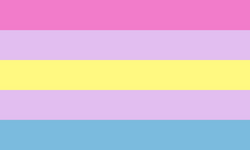Aporagender: Difference between revisions
imported>NbwikiUploadBot m (→References: removing import tag) |
No edit summary |
||
| Line 4: | Line 4: | ||
| flag = aporagender.png | | flag = aporagender.png | ||
| related = [[aliagender]], [[maverique]], [[neutrois]] | | related = [[aliagender]], [[maverique]], [[neutrois]] | ||
| percentage = 0. | | percentage = 0.2 | ||
| meaning = The pink, blue and purple lines represent feminine, masculine, and androgynous genders and are to the sides to symbolize how the centered yellow line (representing gender outside those bounds) is distinct from such genders but still connected through being a gender. | | meaning = The pink, blue and purple lines represent feminine, masculine, and androgynous genders and are to the sides to symbolize how the centered yellow line (representing gender outside those bounds) is distinct from such genders but still connected through being a gender. | ||
| gallery_link = Pride Gallery/Aporagender | | gallery_link = Pride Gallery/Aporagender | ||
Revision as of 08:41, 3 April 2019
| |
This page is about a gender identity that is not widely used among gender-variant people. This does not mean that the identity is not valid, but that very few people are known to use this term. More information on uncommon identities... |
 Meaning The pink, blue and purple lines represent feminine, masculine, and androgynous genders and are to the sides to symbolize how the centered yellow line (representing gender outside those bounds) is distinct from such genders but still connected through being a gender. | |
| Related identities | aliagender, maverique, neutrois |
|---|---|
| Click here to see alternative flags! | |
Aporagender (from Greek apo, apor "separate" + "gender"[1]) is a nonbinary gender identity and umbrella term[2] for "a gender separate from male, female, and anything in between while still having a very strong and specific gendered feeling" (that is, not an absence of gender).[3]
History
The original moderator of the Aporagender blog on tumblr coined the word aporagender in 2014.[4] The person who coined the word "aporagender" made it as an alternative to aliagender, due to concerns that aliagender might be "racist or appropriative."[5]
Hyaenahart designed the aporagender pride flag, which is shown at right.[6] "Blue & Pink have been put on either end of the flag to show that you feel your gender is 'away' from these two colours, stereotyped as blue being masculine and pink being feminine. Purple to represent as feeling between male and female. Yellow to represent how the gender is nothing like being female, male or both, but is also placed close enough to blue, purple and pink to show that it’s still connected strongly to some sort of specific gender. Yellow also represents how it’s a non-binary identity."[7]
As an umbrella term
"Aporagender is under the nonbinary umbrella, but is a more specific label" than nonbinary. Aporagender is also an umbrella term for some nonbinary identities.[8] As an umbrella term, aporagender includes some kinds of nonbinary and genderqueer people, but "doesn’t include people who are agender, between male and female, or binary trans people."[9] Therefore, aporagender is a more specific umbrella term than "genderqueer," because when genderqueer is used as an umbrella term, it sometimes includes binary trans people and gender nonconforming binary cisgender people. "Aporagender is pretty much everything that isn’t male, female, agender, or between male and female."[10]
Difference from other genders
Aporagender isn't the same thing as androgyny, because androgyny can mean a mix of female and male, or in between female and male, whereas aporagender "is any nonbinary identification that isn’t male, female, or anything in between while still having a strong sense of gender."[11]
Aporagender is different than agender or genderless, because these mean that a person has no inner sense of their gender, whereas aporagender people have a strong inner sense of their gender.
Some people who call their gender neutrois define neutrois as having no inner sense of their gender (genderless), whereas other neutrois people use it to mean having a gender that is not female, not male, not between, but neutral. In the former sense, aporagender isn't a synonym for neutrois, because aporagender people have an inner sense of their gender.[12] In the latter sense, aporagender can be a synonym for neutrois, "but as not everyone uses the same definition [of neutrois], aporagender is still needed for some people."[13]
In order to be aporagender, a person needs to have a feeling of having a gender, and that their "gender is completely and totally not male or female."[14] Since some neutrois people use neutrois to mean that they have no inner sense of gender, aporagender is not a synonym of that, because aporagender people have a sense of gender.[15] In that case, in its most specific sense, aporagender is a synonym with neutrois, if neutrois is used in its definition that means "not female, not male, not between female or male." That said, neutrois has many definitions, so aporagender is only a synonym for one of these.
See also
External links
References
- ↑ http://aporagender.tumblr.com/post/88346079784/could-i-ask-the-etymology-of-the-prefix-apora
- ↑ http://aporagender.tumblr.com/aporagender
- ↑ http://aporagender.tumblr.com/aporagender
- ↑ http://aporagender.tumblr.com/post/88328947879/aporagender-is-a-term-recently-coined-by-me
- ↑ http://aporagender.tumblr.com/post/103598129904/aporagender-vs-aliagender
- ↑ http://aporagender.tumblr.com/post/88699128869/aporagender-pride-buttons
- ↑ http://aporagender.tumblr.com/post/88675303724/pride-flags-for-us-a-flag-proposal-for
- ↑ http://aporagender.tumblr.com/post/88495444809/shutupsocialjustice-aporagender-aporagender
- ↑ http://aporagender.tumblr.com/post/88777570724/hi-id-like-to-know-how-aporagendered-is
- ↑ http://aporagender.tumblr.com/post/88773280769/so-like-agender-goes-under-apora-umbrella-what
- ↑ http://aporagender.tumblr.com/post/88795871409/aporagender-without-wiki-representation
- ↑ http://aporagender.tumblr.com/post/88820244904/aporagender
- ↑ http://aporagender.tumblr.com/post/89269060179/neutrois-is-not-agender-neutrois-is-a-gender-that
- ↑ http://aporagender.tumblr.com/post/88820008594/queerascat-so-i-just-stumbled-upon-a-new-gender
- ↑ http://aporagender.tumblr.com/post/88820244904/aporagender
